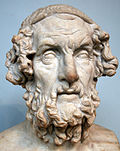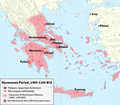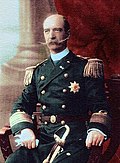Portal:Greece/sandbox
Introduction
 |
|
Selected article article –
Doménikos Theotokópoulos (Greek: Δομήνικος Θεοτοκόπουλος, IPA: [ðoˈminikos θeotoˈkopulos]; 1 October 1541 – 7 April 1614), most widely known as El Greco (Spanish pronunciation: [el ˈɡɾeko]; "The Greek"), was a Greek painter, sculptor and architect of the Spanish Renaissance, regarded as one of the greatest artists of all time. El Greco was a nickname, and the artist normally signed his paintings with his full birth name in Greek letters often adding the word Κρής (Krḗs), which means "Cretan" in Ancient Greek.
El Greco was born in the Kingdom of Candia (modern Crete), which was at that time part of the Republic of Venice, Italy, and the center of Post-Byzantine art. He trained and became a master within that tradition before traveling at age 26 to Venice, as other Greek artists had done. In 1570, he moved to Rome, where he opened a workshop and executed a series of works. During his stay in Italy, El Greco enriched his style with elements of Mannerism and of the Venetian Renaissance taken from a number of great artists of the time, notably Tintoretto and Titian. In 1577, he moved to Toledo, Spain, where he lived and worked until his death. In Toledo, El Greco received several major commissions and produced his best-known paintings, such as View of Toledo and Opening of the Fifth Seal. (Full article...)
General images –
Did you know?

- ...that the Greeks were the first to develop an alphabet with vowels?
- ...that the Greco-Buddhist art is an artistic manifestation of Greco-Buddhism, a cultural syncretism between the Greek culture and Buddhism, which developed in Central Asia after the conquests of Alexander the Great?
- ...that the Rio–Antirrio bridge between the Peloponnese and mainland Greece is the longest cable stayed-suspended deck in Europe?
- ...that the country's highest mountain, Mount Olympus was said to be the home of the Greek Gods in ancient Greek religion?
- ...that the Olympic Games originated in Greece 3000 years ago, and that the 1st games of the modern Olympics were held in Greece in 1896, as a revival of the Games?
- ...that the Greek state comprises only the centre of the ancient Greek world, which comprised also Southern Italy, the coastal areas of modern Turkey and the Black Sea, as well as some colonies in North Africa, Southern France and Spain?
- ...that even though the modern Greek state was established in 1832, some areas of Greece were not liberated until after the Balkan Wars and WW2?
Topics
Recognized content
1896 Summer Olympics, Alcibiades, Archimedes, Aspasia, Attalus I, Basiliscus, Battle of Dyrrhachium (1081), Battle of Greece, Byzantine Empire, Byzantine navy, Cleomenean War, Corinthian War, Cretan War (205–200 BC), Demosthenes, Diocletian, El Greco, Epaminondas, Euclidean algorithm, George I of Greece, Greece runestones, Greek mythology, Hippocrates, Manuel I Komnenos, Macedonia (terminology), Orion (mythology), Pericles, Philitas of Cos, Problem of Apollonius, Stamata Revithi, Rhodes blood libel, Slavery in ancient Greece, The Battle of Alexander at Issus, The Penelopiad, Theramenes, Thrasybulus
Greece categories
Literature and philosophy

In Greece, from ancient times down to the present, has been produced countless world-famous poetry in addition to philosophers like Socrates, Plato and Aristotle and historians like Herodotus and Thucydides. Notable figures of modern Greek literature include Odysseas Elytis and Constantine Cavafy.
Sing, O goddess, the anger of Achilles son of Peleus, that brought countless ills upon the Achaeans. Many a brave soul did it send hurrying down to Hades, and many a hero did it yield a prey to dogs and vultures, for so were the counsels of Zeus fulfilled from the day on which the son of Atreus, king of men, and great Achilles, first fell out with one another.
Art

Greek art began in the Cycladic and Minoan prehistorical civilization. The art of ancient Greece has exercised an enormous influence on the culture of many countries from ancient times until the present, particularly in the areas of sculpture and architecture. In the West, the art of the Roman Empire was largely derived from Greek models. In the East, Alexander the Great's conquests initiated several centuries of exchange between Greek, Central Asian and Indian cultures. During the Renaissance , the humanist aesthetic and the high technical standards of Greek art inspired generations of European artists.Read more...
Quotes
Other related portals
WikiProject Greece

|
You are invited to participate in WikiProject Greece, a task force dedicated to developing and improving articles about Greece. |
Notable Greeks
Music

- Spyridon Samaras
- Manolis Kalomiris
- Nikos Skalkottas
- Dimitris Mitropoulos
- Manos Hatzidakis
- Mikis Theodorakis
- Maria Callas
- Nana Mouskouri
- Vangelis Papathanassiou
- Iannis Xenakis
- Stelios Kazantzidis
- Vassilis Tsitsanis
Cinema

- Katina Paxinou
- Dimitris Horn
- Thanasis Veggos
- Melina Mercouri
- Michael Cacoyannis
- Iakovos Kambanelis
- Irene Papas
- Theodoros Angelopoulos
- Yorgos Lanthimos
Architecture
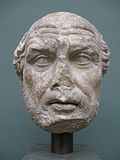
- Ancient
- Medieval
- Modern
Sculpture

- Ancient
- Modern
Painting
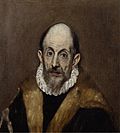
- Ancient
- Modern
Science

- Ancient
- Medieval
- Modern
Philosophy
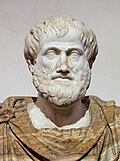
- Ancient
- Medieval
- Modern
Literature

- Ancient
- Medieval
- Modern
Politics

Featured video
Greek Wikipedia
 |
There is a Greek version of Wikipedia, the free encyclopedia. |
Associated Wikimedia
The following Wikimedia Foundation sister projects provide more on this subject:
-
Commons
Free media repository -
Wikibooks
Free textbooks and manuals -
Wikidata
Free knowledge base -
Wikinews
Free-content news -
Wikiquote
Collection of quotations -
Wikisource
Free-content library -
Wikiversity
Free learning tools -
Wikivoyage
Free travel guide -
Wiktionary
Dictionary and thesaurus
More portals
Parent portals: Europe | European Union


















